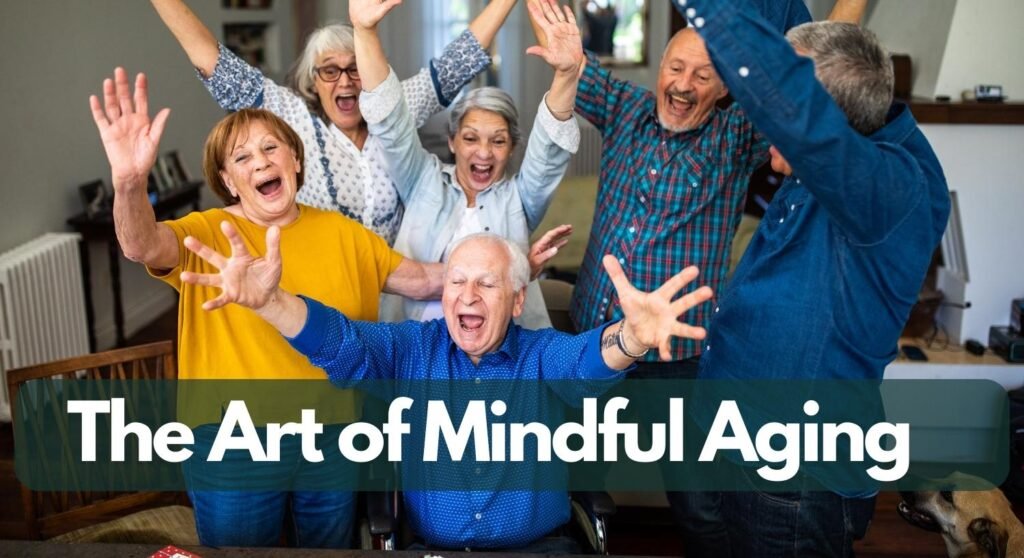Stress Management for Seniors: Essential Tips You Need
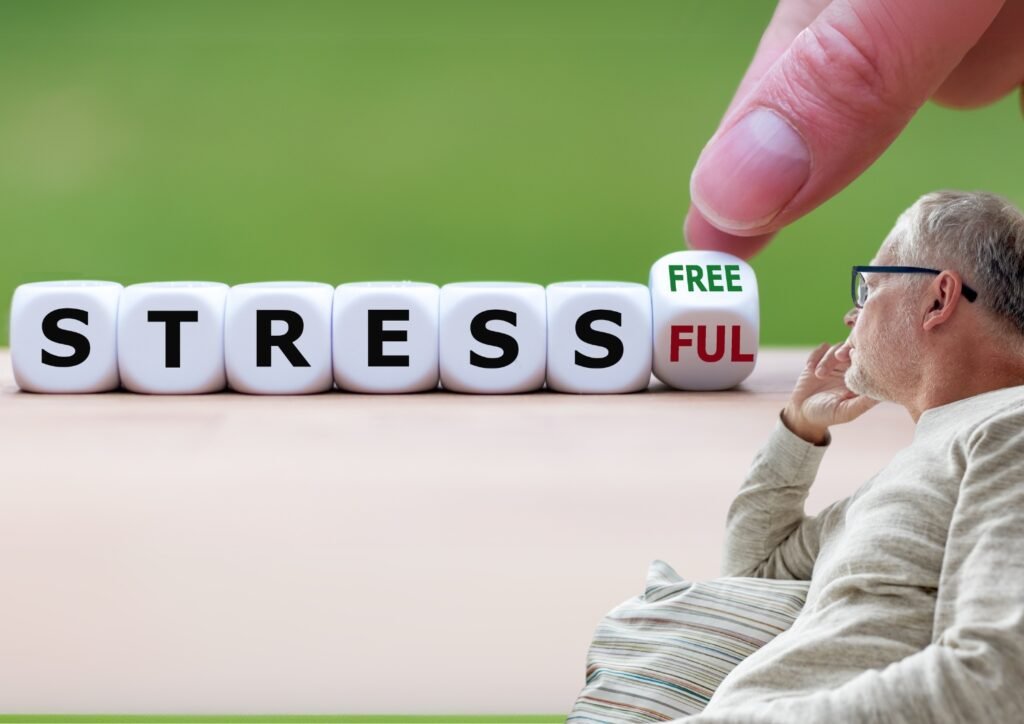
Last Updated on June 27, 2025 by Rose Ann
Life’s challenges don’t disappear when you reach your golden years—they evolve. While you can’t control every curveball life throws, you can master how you respond to stress. Recent research shows that seniors actually possess greater resilience than younger adults when facing stressful situations, making this the perfect time to fine-tune your stress management toolkit.
Effective stress management for mature adults isn’t just about feeling calmer—it also involves protecting your overall health, sharpening your mind, and enhancing your quality of life. When stress goes unchecked, it can manifest as physical aches, sleep disturbances, or that overwhelming feeling that everything is moving too fast.
In this comprehensive guide, we’ll explore five evidence-based strategies that can transform how you handle life’s pressures. From mindfulness practices backed by recent neuroscience research to the surprising power of social connections, these techniques are specifically tailored for your stage of life. You’ll discover practical ways to harness your natural resilience, build stronger coping mechanisms, and create a lifestyle that naturally reduces stress.
Whether dealing with health concerns, financial worries, or simply feeling disconnected from your community, these strategies offer real solutions. The best part? You can start implementing them immediately, regardless of your current fitness level or previous experience with stress management techniques.
Ready to control your stress and unlock a more peaceful, fulfilling lifestyle? Let’s explore the strategies that can make every day more manageable and enjoyable.
Stress Management for Older Adults: What You Should Know
Stress has a sneaky way of creeping into our lives, especially during life transitions and changes. You might notice it first as a persistent tension in your shoulders, restless nights, or that nagging feeling that you can’t quite keep up with everything happening around you.
Recent research involving 170 seniors with an average age of 76 found that structured stress management programs can have significant beneficial effects on emotional health. This groundbreaking study, published in early 2025, demonstrates that it’s never too late to develop better coping strategies.
For many mature adults, common stress triggers include health concerns, financial security, changes in family dynamics, and sometimes feeling disconnected from their community. But here’s the encouraging news: research shows that mature adults actually demonstrate more resilience than younger adults when facing stressful events.
The key is learning to harness this natural resilience through proven techniques that work specifically well for your life stage.
Prefer to listen than read?
Effective Stress Management for Older Adults
So, what’s the game plan? Let’s talk about some practical ways for stress management for older adults, these techniques can make a big difference in how you feel each day.
Mindfulness and Meditation Practices
Have you ever noticed how your mind can race from worry to worry, jumping from yesterday’s regrets to tomorrow’s concerns? Mindfulness offers a gentle way to anchor yourself in the present moment, creating space between you and your stressors.
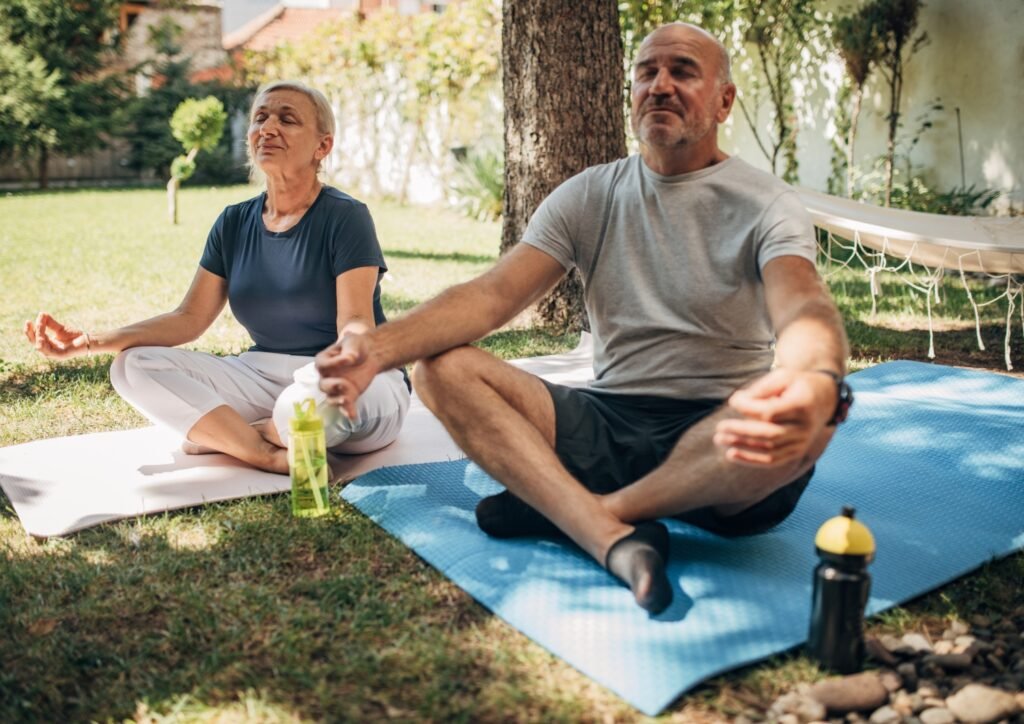
Mindfulness is one of the most effective stress management for older adults. By concentrating on the here and now, you can calm your mind and find peace. Imagine sitting comfortably in your favorite chair. Close your eyes and take slow, deep breaths. Feel the air as it enters your nose and fills your lungs. Notice how your chest rises and falls with each breath.
Feels peaceful, doesn’t it? Doing this for just a few minutes each day can help lower your stress levels over time. You might notice your mind wandering—that’s okay. Gently bring your attention back to your breath. The goal isn’t to stop your thoughts but to observe them without getting caught up. Over time, practicing mindfulness can improve your ability to handle stress and bring a sense of calm to your daily life.
Getting Started with Meditation
Meditation is another effective stress management for older adults. It’s a wonderful way to train your mind to focus and discover a sense of inner peace. You don’t need any special equipment or prior experience to start meditating.
Begin with this simple five-minute practice:
- Find Your Comfortable Spot: Choose a quiet corner of your home or a peaceful spot in your garden. You can sit in your favorite chair with your feet flat on the ground—no need for complicated positions.
- Focus on Your Breath: Close your eyes gently and take a slow, deep breath through your nose. Feel the air filling your lungs, then slowly exhale through your mouth. Notice how your chest naturally rises and falls.
- When Your Mind Wanders: This is completely normal! When you notice your thoughts drifting to your grocery list or tomorrow’s appointment, simply guide your attention back to your breathing—no judgment, just gentle redirection.
- Build Gradually: Start with five minutes daily. Research shows that even four weeks of meditation training can improve sustained attention in community-dwelling mature adults.
Meditation doesn’t require any special equipment or years of training. Think of it as strength training for your mind. Research has shown that meditation done in a chair still provides benefits like lowering blood pressure and heart rate while increasing feelings of well-being.
Try guided meditation apps or online videos specifically designed for beginners. Many offer sessions focused on common concerns like sleep, stress, anxiety, or pain management.
Physical Activities to Reduce Stress
Regular physical activity acts like a natural antidepressant, releasing feel-good chemicals called endorphins that improve your mood and energy levels. The beauty of exercise for stress management is that it doesn’t require intense workouts—gentle, consistent movement can be incredibly effective.
Simple Exercises You Can Do
You don’t have to run a marathon or lift heavy weights to benefit from exercise. Simple activities can make a big difference in stress management for older adults. Here are some ideas:
- Walking: A leisurely stroll around your neighborhood provides fresh air, light exercise, and often opportunities for social interaction. You can walk solo for quiet reflection or with a friend for companionship.
- Gardening: Working with soil and plants connects you with nature while providing gentle physical activity. There’s something deeply satisfying about nurturing plants and watching them grow.
- Swimming: Water-based activities are gentle on joints while providing excellent full-body exercise. Many community centers offer water aerobics classes specifically designed for mature adults.
- Tai Chi and Gentle Yoga: These practices combine gentle movement with mindfulness, improving flexibility, balance, and stress management simultaneously.
- Dancing: Put on your favorite music and move to the rhythm. Dancing in your living room is a joyful way to get your heart pumping and boost your mood.
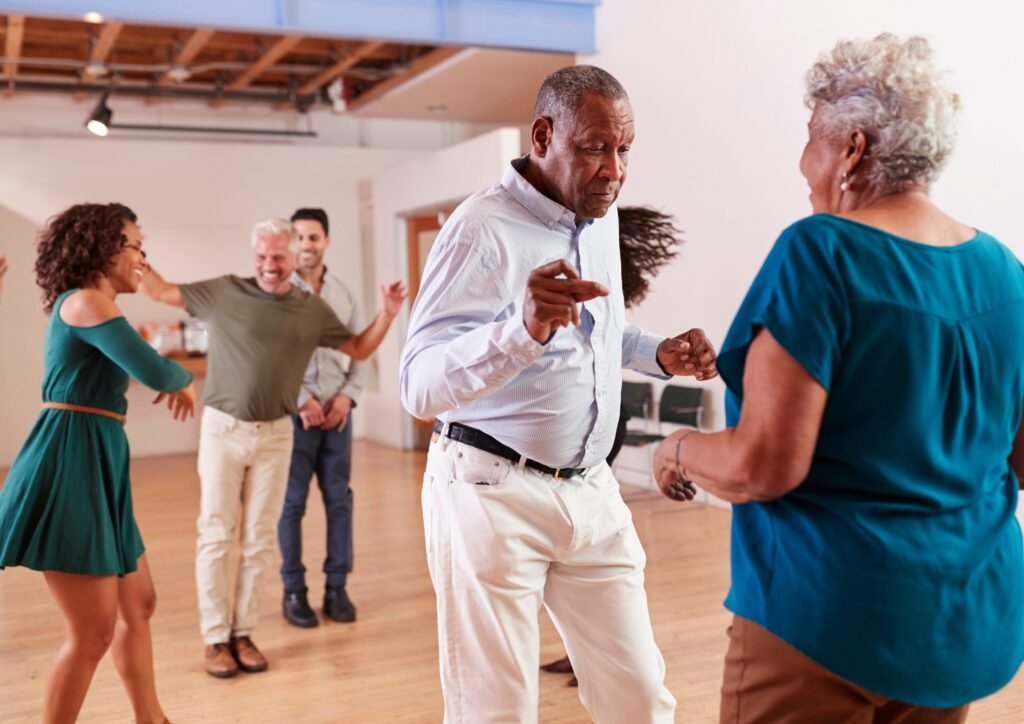
Finding the Right Activity for You
The important thing is to choose activities you enjoy. This makes it more likely you’ll stick with them. Here are some tips:
- Start Small
- Even small amounts of movement throughout the day can add up. Try taking short walks or doing light stretching.
- Listen to Your Body
- Pay attention to how you feel during and after exercise. If something hurts, stop and try a different activity.
- Make It Social
- Join a group class or exercise with a friend. This adds a social element that can make the activity more enjoyable.
- Set Realistic Goals
- Setting small, achievable goals can keep you motivated. For example, aim to walk for 15 minutes a day, three times a week.
Regular physical activity is a key part of stress management for older adults. It helps reduce stress, improves your mood, and keeps your body healthy. So find an activity you love and make it a part of your routine!
Social Connections and Community Engagement
Getting involved in local activities is another effective stress management for older adults. Here are some ideas:
- Join Local Clubs
- Look for groups that match your interests, like book clubs, gardening societies, or art classes.
- Attend Community Events
- Participate in festivals, markets, or concerts in your area.
- Volunteer
- Offer your time at a local charity, school, or hospital. Volunteering can give you a sense of purpose.
- Take Classes
- Learn something new by taking courses at a community centre or library.
Start small and listen to your body. Even 15 minutes of gentle activity three times per week can make a noticeable difference in your stress levels. Set realistic goals and celebrate small victories—consistency matters more than intensity.
Benefits of Social Connections
Humans are naturally social beings, and maintaining strong connections becomes even more crucial for stress management as we navigate life changes. Social isolation can amplify stress, while meaningful relationships provide emotional support, practical help, and joy.
- Reduces Loneliness
- Being with others can make you feel less alone.
- Boosts Mood
- Social interactions can improve your happiness and outlook on life.
- Provides Support
- Friends and family can offer help and advice when you’re feeling stressed.
- Keeps Mind Active
- Conversations and activities can keep your brain engaged and sharp.
Building and Maintaining Connections
- Join Interest-Based Groups: Look for clubs that align with your hobbies—book clubs, gardening societies, art classes, or walking groups. Shared interests create natural conversation starters and potential friendships.
- Volunteer Your Time: Contributing to causes you care about provides a sense of purpose while connecting you with like-minded individuals. Whether it’s mentoring youth, supporting local charities, or helping at community events, volunteering can significantly reduce stress while making a positive impact.
- Stay Connected with Family: Schedule regular phone calls or video chats with loved ones. Don’t wait for others to reach out—take the initiative to maintain these important relationships.
- Explore Community Resources: Many communities offer programs specifically designed for mature adults, including social groups, educational classes, and recreational activities.
The Health Benefits of Social Connection
Strong social connections don’t just feel good—they’re actually good for your health. Regular social interaction can reduce feelings of loneliness, boost your mood, provide emotional support during challenging times, and keep your mind active and engaged.

Healthy Eating Habits
You’ve probably heard the saying, “You are what you eat.” It’s true—what you put into your body affects how you feel, both physically and mentally. Eating a balanced diet is another effective stress management for older adults. The right foods can help improve your mood, boost your energy levels, and make it easier to handle stress.
The Importance of a Balanced Diet
Eating well is one of the most effective stress management for older adults because it keeps your body and mind healthy. A balanced diet provides the nutrients your body needs to function properly. It can help stabilize your blood sugar, improve your sleep, and keep your energy steady throughout the day. All of these things can make it easier to manage stress.
Try to include a variety of foods in your meals:
- Whole Grains: Oats, brown rice, and whole wheat bread provide steady energy without the spikes and crashes that can increase stress and irritability.
- Lean Proteins: Proteins from fish, chicken, beans, and tofu help maintain stable blood sugar levels and provide the building blocks for neurotransmitters that regulate mood.
- Omega-3 Rich Foods: Salmon, walnuts, and flaxseeds support brain health and may help reduce anxiety and improve mood stability.
Foods to Avoid
Certain foods can make stress worse. It’s best to limit:
- Excessive Sugar: High-sugar foods cause blood sugar spikes followed by crashes, leading to fatigue and irritability.
- Too Much Caffeine: While moderate caffeine intake is fine for most people, excessive amounts can increase anxiety and interfere with sleep.
- Heavily Processed Foods: These often contain unhealthy fats and additives that can negatively impact mood and energy levels.

Foods That Boost Brain Health
Certain foods are particularly good for brain health, which can help with stress management for older adults. Omega-3 fatty acids are known for their positive effects on the brain. Foods rich in omega-3s, like salmon, walnuts, and flaxseeds, can help support cognitive function and reduce anxiety. Including these foods in your diet can help keep your mind sharp and your mood stable.
Stay Hydrated
Don’t underestimate the power of staying well-hydrated. Dehydration can cause fatigue, headaches, and irritability, all of which make stress feel worse. Aim for eight glasses of water daily, and consider herbal teas for variety and additional relaxation benefits.
Tips for Healthy Eating Habits
Here are some tips to help you make healthy eating a part of your daily routine:
- Plan Your Meals
- Planning your meals ahead of time can help you make healthier choices. It also makes grocery shopping easier and ensures you have nutritious foods on hand.
- Eat Regularly
- Skipping meals can lead to low blood sugar, which can make you feel tired and more stressed. Try to eat at regular intervals throughout the day to keep your energy levels stable.
- Make It Enjoyable
- Healthy eating doesn’t have to be boring. Try new recipes, cook with friends or family, and experiment with different flavors. Enjoying your food is an important part of maintaining healthy habits.
Healthy eating is a key part of stress management for older adults. By focusing on a balanced diet, avoiding foods that increase stress, and staying hydrated, you can improve your mood, boost your energy levels, and handle stress more effectively. Remember, every small change you make towards eating healthier can make a big difference in how you feel.
Importance of Adequate Sleep
Good sleep is like a reset button for your body and mind. During quality sleep, your body repairs itself, processes emotions, and consolidates memories. Poor sleep, on the other hand, can make even small stressors feel overwhelming.
Why Sleep Matters for Stress Management for Older Adults
When you sleep well, you wake up feeling refreshed and ready for the day. Adequate sleep improves your mood, memory, and overall health. Without enough sleep, you might feel tired, grumpy, or find it hard to concentrate. This can make stress feel even worse.
Sleep is like a reset button for your body. It gives your heart and blood vessels time to heal and helps your immune system stay strong. For seniors, good sleep is a key part of stress management for older adults.

Creating Your Ideal Sleep Environment
- Consistent Sleep Schedule: Try to go to bed and wake up at the same time each day, even on weekends. This helps regulate your body’s internal clock.
- Comfortable Sleep Space: Ensure your bedroom is cool, dark, and quiet. Consider blackout curtains or a white noise machine if needed.
- Wind-Down Routine: Develop a relaxing pre-sleep routine—perhaps reading, gentle stretching, or listening to calming music.
- Limit Screen Time: The blue light from phones, tablets, and TVs can interfere with your body’s natural sleep signals. Try to avoid screens for at least an hour before bedtime.
Seeking Professional Help
Sometimes, handling stress solo isn’t enough, and that’s perfectly okay.
- When to Consult a Healthcare Professional
- If stress starts throwing a wrench in your daily life—persistent sadness, loss of interest in activities you love, or changes in appetite—it might be time to chat with a pro.
- Your healthcare provider can offer guidance tailored just for you.Early intervention can prevent more serious issues down the line. There’s strength in seeking help when you need it.
- Benefits of Counseling and Therapy
- Counselling isn’t just lying on a couch and spilling secrets. It’s a safe space to express your feelings and learn new coping strategies.
- Therapists can help you navigate complex emotions and develop personalized techniques to keep stress at bay.Many seniors find group therapy beneficial, too. Sharing experiences with peers can provide comfort and new perspectives.
Embracing a Stress-Free Lifestyle
Time to sprinkle some joy into your life!
- Hobbies and Leisure Activities
- Remember that hobby you always wanted to try? Now’s the time! Engaging in activities you love—be it gardening, painting, or playing an instrument—can distract from stress and add zest to your days.
- Hobbies not only fill your time but also give you a sense of accomplishment. Who knows? You might discover a hidden talent.
- Travel and Exploration Opportunities
- Who says adventure is just for the youngsters? Exploring new places, even if it’s just a nearby town or a scenic spot, can refresh your spirit.
- And with so many beautiful destinations in Australia, the possibilities are endless. Consider joining a senior travel group to share experiences and make new friends along the way.
- Volunteering and Giving Back
- Lending a hand not only helps others but also uplifts your own spirit. Volunteering offers a sense of purpose and connects you with like-minded folks, all while keeping stress levels in check.
- Whether it’s mentoring youth, supporting local charities, or participating in environmental projects, your contribution makes a difference.
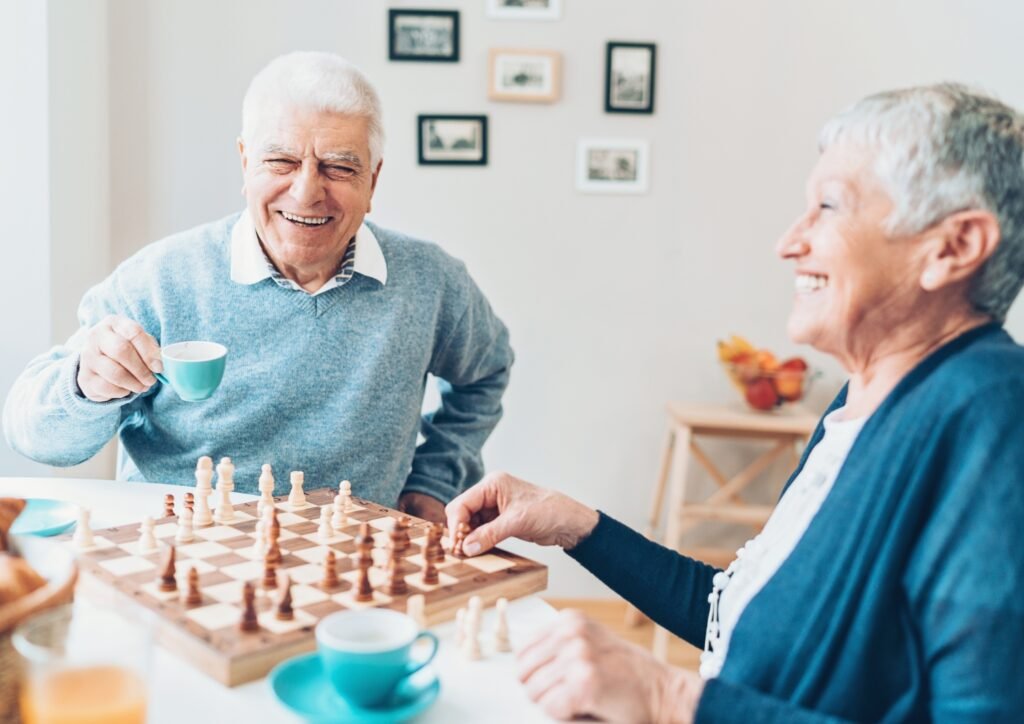
Embracing a Stress-Resilient Lifestyle
Rediscover Your Passions
Remember that hobby you always wanted to try? Now might be the perfect time! Engaging in activities you love—whether it’s painting, playing an instrument, woodworking, or learning a new language—provides natural stress relief and adds joy to your daily routine.
Explore and Adventure
Who says adventure is only for the young? Exploring new places, even if it’s just a scenic spot in your local area, can refresh your spirit and provide new perspectives. Consider joining senior travel groups to combine exploration with social connection.
Give Back to Your Community
Volunteering offers a sense of purpose while connecting you with others. Whether you’re mentoring young people, supporting local charities, or participating in environmental projects, giving back can significantly reduce stress while making a positive impact.
Conclusion
Mastering stress management is one of the most valuable gifts you can give yourself. By embracing mindfulness, staying physically active, nurturing social connections, eating well, and prioritizing sleep, you’re creating a foundation for a more peaceful and fulfilling life.
Remember, you have more resilience and wisdom than you might realize—now it’s time to put that strength to work for you. What stress management technique are you most excited to try first? Have you already found strategies that work well for you? Share your experiences and questions in the comments below—your insights might just help another reader on their journey to better stress management!
REFERENCES
- Richer, Marie-Josée, et al. “Increasing stress resilience in older adults through a 6-week prevention program: effects on coping strategies, anxiety symptoms, and cortisol levels.” Frontiers in Psychology, January 2025.
- Hebrew SeniorLife. “The Impact of Stress on Older Adults and Tips for Managing It.”
- PMC Study. “Mindfulness-Based Interventions for Older Adults: A Review of the Effects on Physical and Emotional Well-being.”
- Frontiers in Aging Neuroscience. “Three potential neurovascular pathways driving the benefits of mindfulness meditation for older adults.”
- Ford, S.D., and L.S. Nagamatsu. “Four weeks of meditation training improves sustained attention in community-dwelling older adults: a proof-of-concept randomized controlled trial.” Frontiers in Aging, March 2024.
- U.S. News & World Report. “The Many Benefits of Meditation for Older Adults.” June 22, 2018.
Disclaimer
The content provided on MySeniors.World is for informational purposes only and is not intended as financial or medical advice. Always consult a qualified professional before making any investment or health-related decisions.
Posts may contain affiliate links, which means we earn a commission—at no additional cost to you—if you click through and make a purchase. Your support helps us continue providing valuable content.



